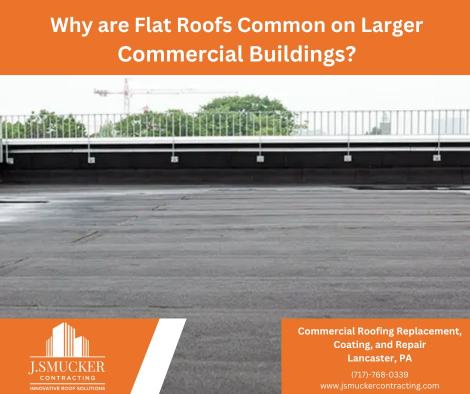- By admin
- Commercial Roofing, Flat Roof
- 0 Comment
Why are Flat Roofs Common on Larger Commercial Buildings?
Have you ever wondered why nearly every large commercial building has a flat roof? There are many reasons why, generally speaking, flat roofs are the best and most common option for large and small commercial buildings. In this article, we’ll explore all of those reasons and help you understand the drawbacks and advantages of a flat roof.
Cost
First and foremost, flat roofs are cheaper to build than more traditional A-frame roofs. Not only do A-frames take up more space and volume, the labor required to build an A-frame roof is going to cost more. The materials required for a flat roof are also cheaper than, for example, metal or shingle roofs which traditionally are used on A-frame’s.
Better Utility
Flat roofs are generally going to provide more usable space for mechanical equipment and HVAC systems, which are often located on the roof of larger commercial buildings. Also provides more space for venting things like plumbing systems, cooking hoods, etc..Obviously, this would become more difficult if the roof is pitched. In addition, most HVAC units are package units, where the indoor and outdoor systems are combined into the same unit. Making them larger and heavier. This is in contrast to traditional HVAC units like a home for example, that would have a separate indoor and outdoor unit.
For those reasons, commercial units as a package are located on the roof where the duct-work would come in from the outside.
What Additional Benefits do Flat Roofing Systems Provide?
From a maintenance standpoint, a flat roof can be considered a double edged sword. The positive aspect would be that they allow for easy and safer access for maintenance and repairs. This extends to both the roof system maintenance itself, as well as HVAC, plumbing or electrical maintenance. The last thing anyone repairing an HVAC system wants is to have to walk across and operate on a highly pitched roof.
The downside of a flat roof is that if left unserviced and unmaintained, you could find yourself in a situation where you’ve basically built yourself a pool on your roof! Therefore, it’s important to note that flat roofs require regular maintenance and inspection to prevent water from ponding and to ensure that the roofing materials are in good condition. Lastly, it’s important to consult with a professional roofing contractor to ensure that a flat roof is appropriate for the building’s location and climate.
For additional information regarding downsides that one must be aware of when owning and managing a commercial flat roof, you can read one of our previous articles entitled ‘Low Slope Roofing Plagues‘
Additional benefits would be that flat roofs are more efficient in terms of energy consumption: they are less exposed to sun and wind, which can help to reduce heating and cooling costs for the building.
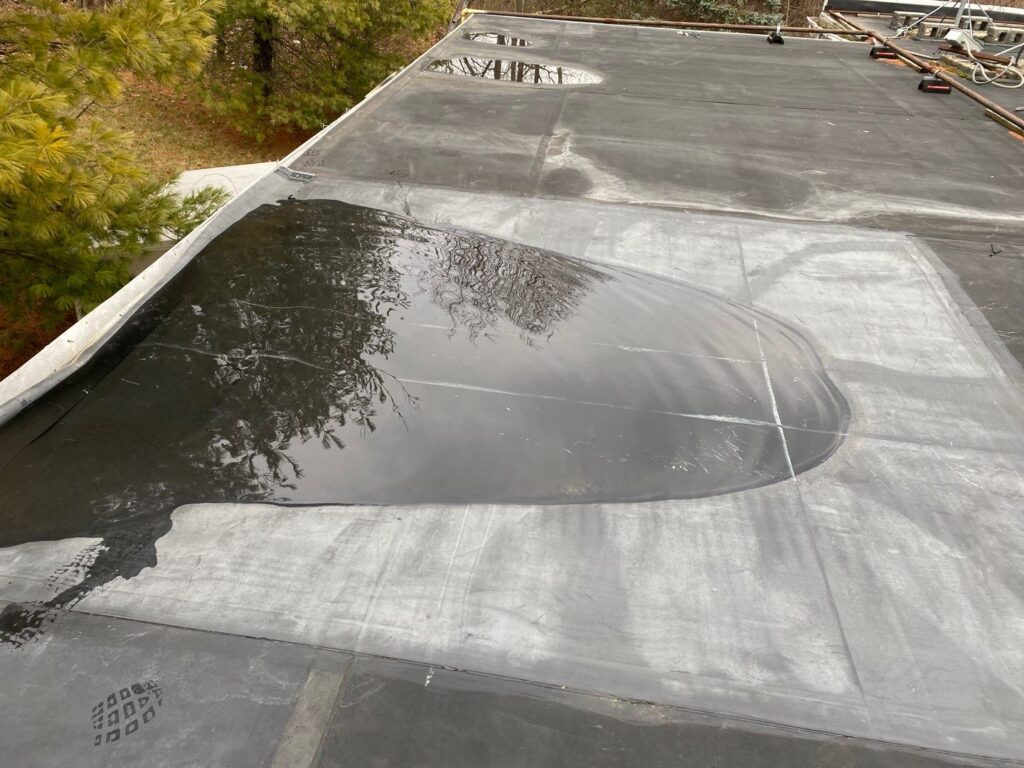
Roof "ponding", if left untreated, can wreak major havoc on the roof membrane
Flat Commercial Roof Types
If you’re considering a new commercial build. It’s important to understand the main types of roofing systems that have
Modified Bitumen
Modified Bitumen has been on the market for nearly 100 years and is closely related to the Built Up Roof (BUR). It consists of asphalt and polymerized rubber, which for the time, was fairly good at weatherizing commercial and residential buildings. Modified Bitumen is not as common as they used to be, and frankly, barely any contractors are putting this type of roof system down anymore.
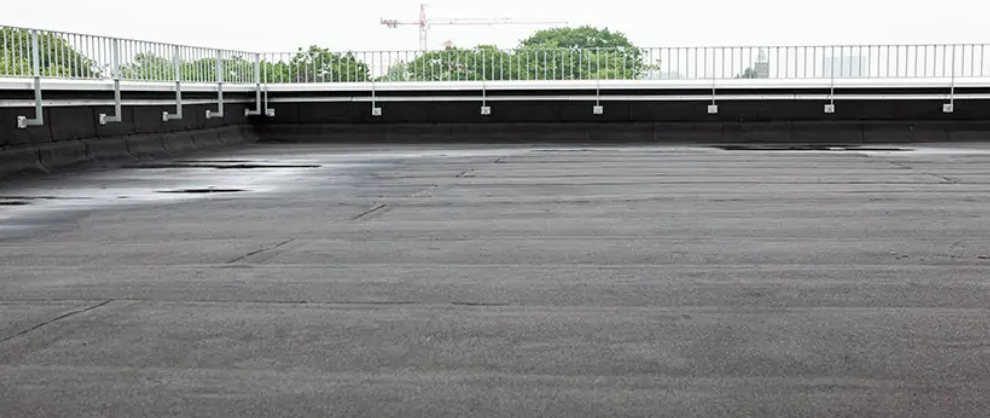
Modified Bitumen roofing systems are not as popular as they used to be
EPDM
EPDM (ethylene propylene diene monomer) is a roofing system made from a synthetic rubber material. It was traditionally known for longevity and resistance to high temperatures, leaks, and other weather conditions. Historically, it was a popular choice for flat commercial roofs due to its flexibility and ability to expand and contract with the temperature changes. One of the downsides to EPDM roofs is that they are not as resistant to chemicals and UV radiation as other roofing materials.
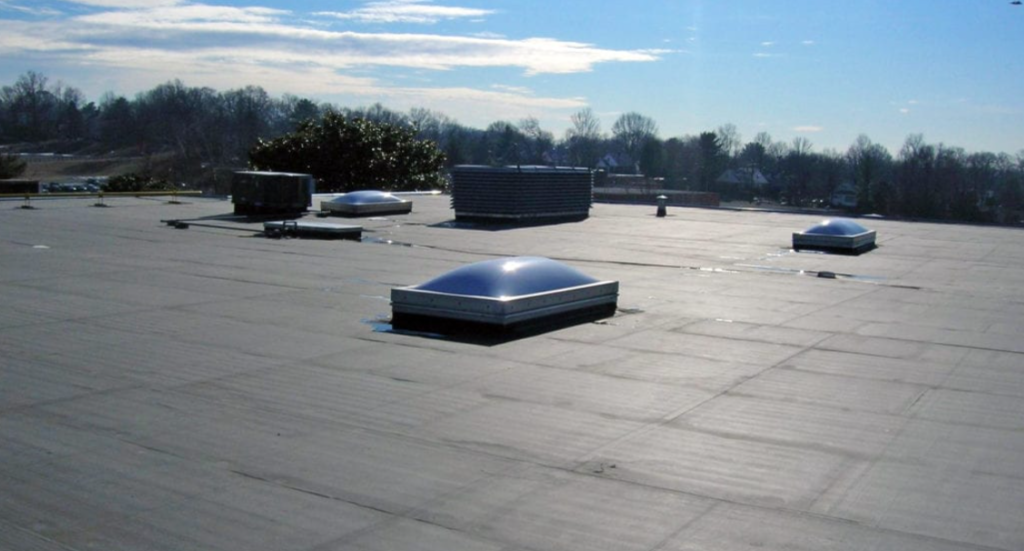
TPO
TPO (thermoplastic olefin) is a single-ply roofing material that is to a large part very similar to PVC. TPO roofs are known for their high reflectivity, which can help to reduce the building’s cooling costs. They are generally pretty durable and resistant to ruptures and tears. TPO roofs typically come with a white surface, which can reflect a very large portion of the sun’s rays, reducing heat build-up and energy costs. Additionally, due to the light weight of the material, TPO roofs are considerably less difficult to install than other roofing systems.
TPO roofing has as much as three times greater resistance to punctures from foreign objects, unlike EPDM, which tears more easily. This is extremely important for preventing leaks. Known for its resistance to fungi and mold, and the accumulation of dirt, TPO is also better at withstanding chemicals, acids, and oils than EPDM
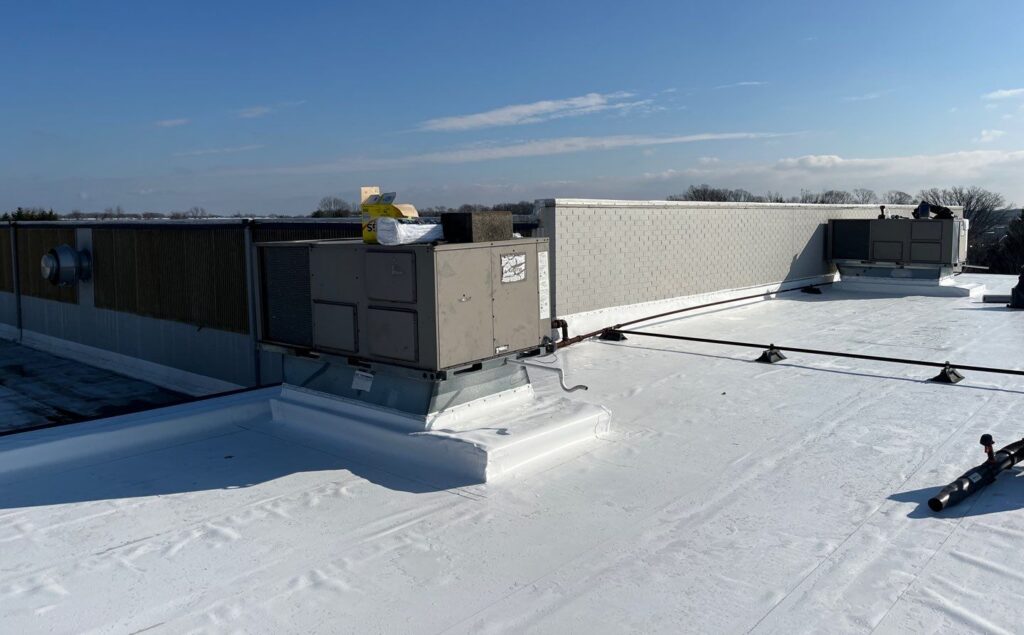
PVC
PVC (Polyvinyl chloride) is a popular choice for flat commercial roofs because of its durability, flexibility and resistance to extreme weather conditions. PVC roofs are also known for their high reflectivity, which can help to reduce the building’s cooling costs. An additional benefit to PVC is that they are highly resistant to chemicals. Their composition also makes them more impervious to tears than all of the other materials mentioned above. In terms of quality, a PVC roof would be the highest quality roofing material currently on the market. If you are thinking about replacing your flat roof, and your budget allows, most qualified commercial roofing contractors would recommend PVC as the best choice for your upcoming roof replacement.
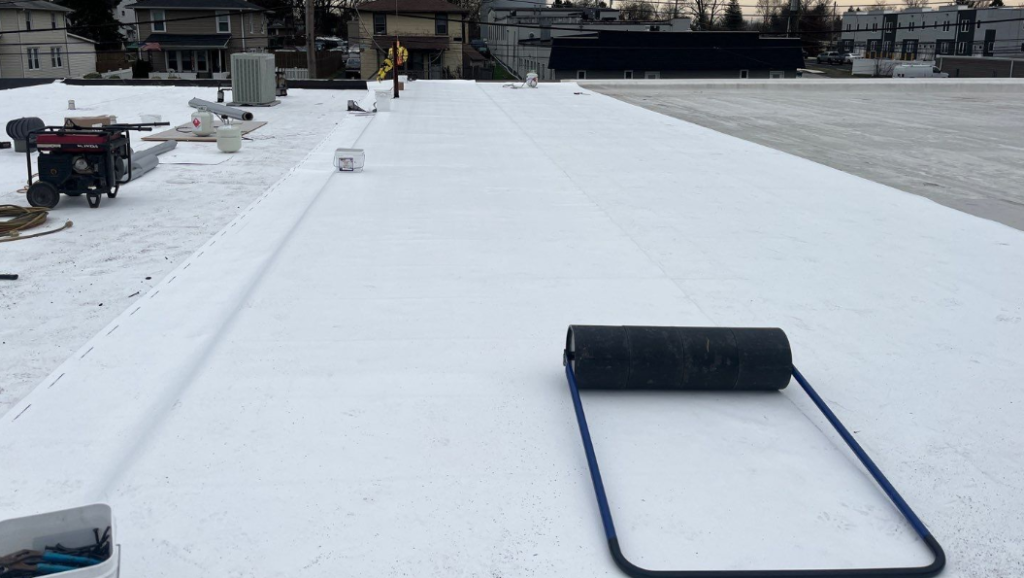
Commercial Flat Roofing in Lancaster PA
J Smucker Contracting is a trusted and experienced flat roof installation contractor, dedicated to providing high-quality services to its customers. With decades of experience and a team of highly skilled and certified professionals, we are knowledgeable in all aspects of flat roof installation.
We offer a wide range of services, including flat roof repair, replacement, coating and installation. We utilize market-leading materials such as Conklin, Flex, GAF, and Versico with every flat roof installation and repair to ensure that the final product is of the highest quality. For years, customers have trusted our reputation, experience, and commitment to quality work for their flat roofing needs. If you’re looking for flat roof installation in Lancaster PA or the surrounding tri-state area Contact us today with any additional questions!

